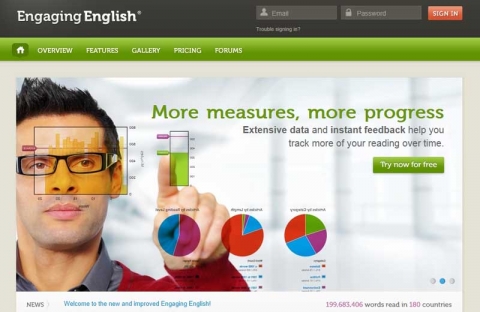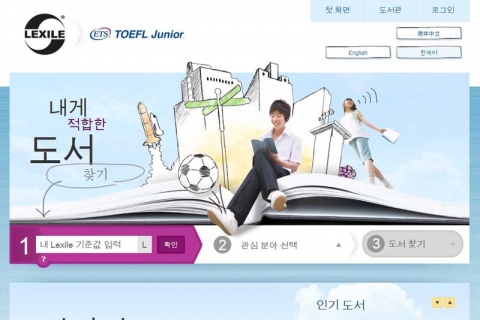Korean interest in English reading is booming from the example of United Nations Secretary General, Ban Ki-moon
Lexile measures provide an effective tool for matching readers with text to improve learning
-

A free 10-day trial membership is available at www.engagingenglish.com.
-

MetaMetrics hosts a free online service to access the Lexile titles database and create custom reading lists (www.lexile.com/toefljunior)
SEOUL--(Korea Newswire)--In this global age, where a high level of English fluency is increasingly required for academic and workplace opportunities, there is exploding interest in English education, especially among mothers. A housewife who lives in Seong-nam, Korea, is one of those mothers. Recently she took her 6-year-old son out of the early English education programs in his kindergarten in favor of a different approach. She is teaching him to read books in English. Great courage was needed, but she believe in the importance of developing her son’s English through reading practice. She learned of this method from a biography of United Nations Secretary-General, Ban Ki-moon.
She is not the only person. Many mothers are eager to have their kids read more English books as a way of improving their learning. This approach is gaining popularity in Korea as biographies of Mr. Ban, who was reelected the UN Secretary General last June, hit the shelves and became popular. Mr. Ban famously said in his book, “Study like a fool, dream like a genius,” and this applied to his reading. He carried his favorite English books with him wherever he went and read whenever he could. Through his dedication and commitment, he became an excellent reader. In fact, the basic principles of his learning method are supported by a prominent expert in reading research.
Dr. Malbert Smith III, the co-founder and president of MetaMetrics® (www.metametricsinc.com), says that Mr. Ban’s method is classic and effective. “Reading regularly with commitment over a long period is essential to develop genuine reading skill. And just like any skill, better practice leads to more improvement.” Dr. Smith stresses the importance of choosing books that match the reader’s interests and skill level as key ingredients of effective reading practice. “Reading books at the right level of complexity provides the appropriate challenge and reduces frustration, while reading on subjects of personal interest encourages more engagement. These are key ingredients of effective reading practice.”
In the 1950s and 60s, when Mr. Ban was in school, few English books were available for Koreans through public school. This left him few options for reading practice. He could re-read the limited selection from school, or he could go find foreign books written in English on a broad range of subjects. Reading diversely on preferred subjects held more appeal and fed Mr. Ban’s hunger to read more.
For Koreans like Mr. Ban, who are learning English as a second language, there are many benefits to a persistent focus on reading. Reading can be practiced independently any time, and it provides a supportive foundation for developing other skills like writing and speaking. Reading foreign books also increases exposure to the cultural and historical aspects of the English language, which can enhance overall English communication skills.
Dr. Smith’s company, MetaMetrics, developed The Lexile® Framework for Reading (www.lexile.com) to help individualize and improve reading. “The Lexile Framework provides a scientific way to match readers with texts,” says Dr. Smith. “When a reader and text are matched using Lexile measures, learning improves.”
Today in the U.S., Lexile measures are the standard for matching readers with text. Tens of millions of students receive Lexile measures each year from a wide variety of commercial reading tests and state assessment programs. Publishers have had over 100,000 books measured, while hundreds of millions of periodical articles have been measured by digital content providers like EBS Co.. MetaMetrics is even measuring web pages written in English from online newspapers and publications around the world.
Dr. Smith says, “Reading should not be frustrating or boring, so reading choices should be made thoughtfully based on each individual.” He recommends getting a Lexile measure to help in making reading selections.
In fact, Lexile measures are catching on in Korea as a meaningful measure of reading skill. Following nearly 30 years of extensive research and partnerships in the U.S., MetaMetrics is expanding its reach internationally. In Korea, English learners currently can get their Lexile measure from Natmal’s English Lectio Quotient (EL-Q) test, from ETS®’s TOEFL® and TOEFL® Junior™ tests, and from Scholastic Reading Inventory tests. And MetaMetrics is actively working to expand its Korean testing partnerships and link more English reading tests to the Lexile scale in the year ahead.
The Lexile measure of a reader describes his or her skill on the Lexile scale, which ranges from below 200L to 1600L and above. Beginning readers and texts measure at the lowest levels, while advanced readers and texts measure 1300L and up. Through its research on the text complexity of various English-language settings, which is now referenced in the U.S. Common Core Standards for English Language Arts, MetaMetrics finds that “university and career readiness” in English reading to be approximately 1200-1400L.
“To achieve the level of English reading proficiency that we observe in many postsecondary and workplace settings,” says Dr. Smith, “readers must stay committed to their practice and improvement throughout their educational life span.” Monitoring progress closely in useful terms is important. Dr. Smith adds, “Lexile measures offer a meaningful way to track reading improvement from an early age to the ultimate goal of university and career readiness.”
Once a reader has his or her Lexile measure, a variety of free online services can help identify English books at the right level that also match the reader’s interests. Korea’s Interpark (www.interpark.com) enables site visitors to browse books for purchase using Lexile measures, as does the USA’s Barnes and Noble (www.bn.com.) For TOEFL® Junior™ test takers, MetaMetrics hosts a free online service to access the Lexile titles database and create custom reading lists (www.lexile.com/toefljunior.) For older teenagers and adults, MetaMetrics’ Engaging English® reading service provides Lexile-based progress monitoring with immediate feedback, along with access to thousands of online articles that match the reader’s Lexile measure and interests for daily reading practice. A free 10-day trial membership is available at www.engagingenglish.com.
Finally, many public libraries across Korea that specialize in English books now operate programs using the Lexile Measures. Public English Library, an affiliate under the Busan central library, classified over forty thousand books in their collection based on the Lexile Measure. Every program applicant takes a Scholastic Reading Inventory test, and then uses the resulting Lexile measure to select English books at the right reading level. Other libraries in Seoul have also followed these steps. Now at Banpo English Center in Seocho, Mapo children's English Library, Yangcheon English Library, and Learning Experience Center, you will find English books classified based on the Lexile Measure.
Lexile: http://www.lexile.com
Engagingenglish.: http://www.engagingenglish.com
Contact
Kiwi Public Relations
+82-70-8236-8232
This is a news release distributed by Korea Newswire on behalf of this company.

